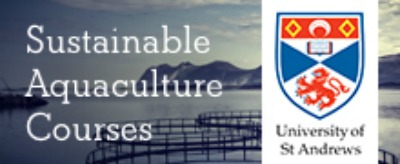Sustainable Aquaculture – Distance Learning (modular course) 2017 entry
The Sustainable Aquaculture modular course allows students to study individual modules from a range of part-time, e-learning, postgraduate-level modules which aim to develop students' critical understanding of the development and principles of aquaculture. The credits for each module successfully completed may be transferred and contribute towards a postgraduate qualification (PG Cert, PGDip, MSc) at a later date.
Course type
Postgraduate
Course duration
9 to 12 weeks part time, depending on the modules chosen for study
Entry requirements
A 2.1 undergraduate Honours degree in a relevant biological science. Entry will also be offered following successful completion of the Undergraduate Certificate in Sustainable Aquaculture in conjunction with additional evidence of relevant professional experiential learning.
If you studied your first degree outside the UK, see the international entry requirements.
English language proficiency. See English language tests and qualifications.
The qualifications listed are indicative minimum requirements for entry. Some academic Schools will ask applicants to achieve significantly higher marks than the minimum. Obtaining the listed entry requirements will not guarantee you a place, as the University considers all aspects of every application including, where applicable, the writing sample, personal statement, and supporting documents.
Tuition fees
£1,250 per 10-credit module
Application deadline
Application requirements
- CV
- two original signed academic references
- academic transcripts and degree certificates
- covering letter indicating which modules to be studied
- English language requirements certificate.
For more guidance, see supporting documents and references for postgraduate taught programmes.

More information about the course and degree routes can be found on The Fish Site.
Course information
The Sustainable Aquaculture distance learning modular programme is taught part time via an online e-learning platform offering online tutorial support, direct email contact with tutors, video streams and access to student bulletin boards. This structure allows students the maximum flexibility to complete their studies while continuing in their employment.
Highlights
- Flexible modular e-learning allows students to complete their studies while continuing in their employment.
- The course uses an online e-learning platform with tutorial support, direct contact with tutors, video stream and access to student bulletin boards.
Teaching format
Classes are taught through a combination of weekly lectures and tutorials and are assessed through a combination of written examinations and coursework.
Further particulars regarding curriculum development.
Modules
The modules in this programme have varying methods of delivery and assessment. For more details of each module, including weekly contact hours, teaching methods and assessment, please see the latest module catalogue which is for the 2016-2017 academic year; some elements may be subject to change for 2017 entry.
Modules available
- Aquaculture and Fisheries: the global importance of aquaculture and fisheries industries worldwide.
- Biology for Aquaculture: the fundamental biology, anatomy and physiology of both invertebrate and vertebrate aquaculture species.
- Biology for Aquaculture Vertebrates: the fundamental biology, anatomy and physiology of vertebrate aquaculture species.
- Biology for Aquaculture Invertebrates: the fundamental biology, anatomy and physiology of either invertebrate aquaculture species.
- Nutrition for Aquaculture: the anatomy, physiology and nutritional requirements of key fish and invertebrate species.
- Nutrition for Vertebrates: the anatomy, physiology and nutritional requirements of key fish.
- Nutrition for Invertebrates: the anatomy, physiology and nutritional requirements of invertebrate species.
- Management, Husbandry and Sustainability: production management and business management of modern aquaculture practices.
- Health and Disease: the factors that influence disease processes in cultured fish and invertebrates.
- Health and Disease Vertebrates: the factors that influence disease processes in cultured fish.
- Health and Disease Invertebrates: the factors that influence disease processes in invertebrates.
- Markets, Products, Processing and Food Safety: advanced knowledge of aquaculture markets, products, processing and food safety.
- Local and Global Impacts of Aquaculture: the environmental impact of aquaculture practices on both local and global scales.
- Breeding and Genetics: selective breeding programmes and modern genetic techniques applied in aquaculture practices.
- Advanced Welfare and Ethics: the welfare and ethical issues raised by current aquaculture practices.
- Recirculation Aquaculture Systems: the use of recirculating aquaculture systems in modern aquaculture practices.
- Ornamental and Aquaria Production: advanced knowledge of animals produced for the ornamental and aquaria section of the aquaculture business.
- Larval Rearing: the larval production techniques used in the aquaculture business.
The modules listed were offered in the academic year 2016–2017 and are indicative of this course. There is no guarantee that these modules will run for 2017 entry. Take a look at the most up-to-date modules in the module catalogue.
Funding
There are many potential scholarships or support schemes available to postgraduates.
Further study
Postgraduate degrees
The credits for each module successfully completed may be transferred and contribute towards a postgraduate qualification at a later date. See the Sustainable Aquaculture MSc/PGDip and Sustainable Aquaculture PG Cert course pages for more information about postgraduate degrees in Sustainable Aquaculture.
Careers
Students who take modules in Sustainable Aquaculture will typically pursue a career in higher level management, research and development or business development within the global aquaculture business.
Contact
School of Biology
Biomolecular Sciences Building
North Haugh
St Andrews
KY16 9ST
Phone: +44 (0)1334 46 3441
Email: pgtaughtbiology@st-andrews.ac.uk
Admission to the University of St Andrews is governed by our Admissions policy.
Curriculum development
As a research intensive institution, the University ensures that its teaching references the research interests of its staff, which may change from time to time. As a result, programmes are regularly reviewed with the aim of enhancing students' learning experience. Our approach to course revision is described online. (PDF, 72 KB).
Tuition fees
The University will clarify compulsory fees and charges it requires any student to pay at the time of offer. The offer will also clarify conditions for any variation of fees. The University’s approach to fee setting is described online. (PDF, 84 KB).